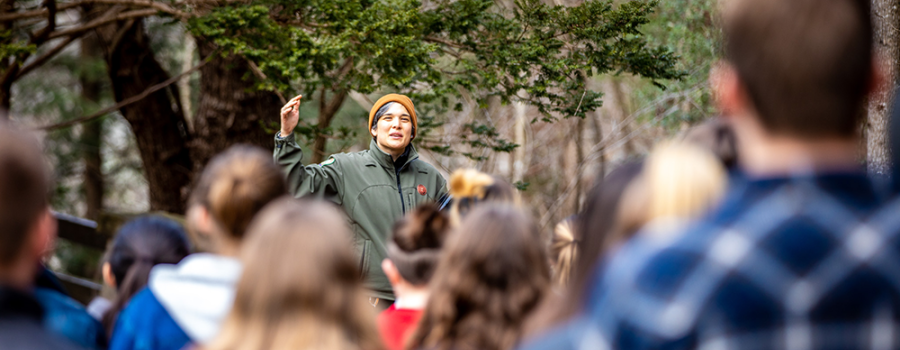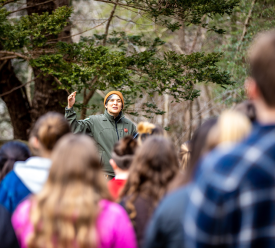Bring biology to life for your future students.
Bring your passion for life sciences into the classroom with a Bachelor’s in Biology Education from University of the Cumberlands. This program provides the training and preparation you need to become an effective biology teacher, combining strong foundations in science with professional education coursework. Housed in the Correll Science Complex, you’ll study in modern laboratories and classrooms equipped with advanced media, audio, and data transmission technology, while learning from dedicated faculty who model what it means to be a great educator.
Biology education majors also benefit from unique opportunities for growth beyond the classroom. Through independent coursework, field study, Presidential Scholar research, and study abroad programs, you can tailor your education to your interests and career goals. Students even have the option to assist faculty with laboratory instruction or research projects, gaining valuable hands-on experience. Whether you plan to teach in Kentucky, across the United States, or abroad, the biology education bachelor’s degree program at Cumberlands prepares you to inspire the next generation of scientists and lifelong learners.
By the numbers
Programs & Requirements
* The credit hours listed on this page only reference the specific program requirements and is not reflective of the total hours necessary to receive your degree. Cumberlands requires all students obtain a minimum of 60 hours for an associate’s degree and a total of 120 hours for a bachelor’s degree. Transfer and prior learning credits may be counted toward those totals.
To learn more about our General Education Requirements, please visit the page referenced below or explore our Academic Catalog.
Bachelor of Science in Biology Education (Secondary Certification)
A biology education major provides the training you need to pursue a career teaching science in public and private schools. This is your opportunity to build a solid fundamental understanding of all sciences, with a special emphasis in biological sciences — from cellular biology to genetics to biodiversity. In addition, you will gain a comprehensive education in age-appropriate lesson planning, classroom management, creating assessments, and other necessary skills that middle school and high school science teachers need to succeed.
Notes:
** Additional 42 Hours of professional education courses required for secondary certification
Students in the B.S. in Biology for Secondary Education have the same 55 Biology credit requirement as Biology majors with the following exception, BIOL 410 - Teaching Practicum in Biology and BIOL 231 - Introduction to Environmental Science or BIOL 448 - General Ecology are required. Students seeking secondary certification must also take the required professional education courses as described in the Department of Education portion of this catalog. Students completing this degree will be required to report scores from the ETS subject area exam in biology prior to graduation.
Course Requirements
In addition to the courses listed, as a biology education major, you will also need to take education courses and complete observation hours in local classrooms. View our course catalog for more details.
- BIOL 113 - Introduction to Population Biology Laboratory
- BIOL 114 - Introduction to Cellular Biology Laboratory
- BIOL 133 - Introduction to Population Biology
- BIOL 134 - Introduction to Cellular Biology
- BIOL 210 - Introduction of Biological Literature
- BIOL 246 - Biodiversity
- BIOL 340 - Genetics
- BIOL 495 - Senior Seminar OR BIOL 498 - Senior Thesis
Choose 1 Biology Emphasis area and Choose 18 credits in that Emphasis area. See Biology Emphasis Requirements.
Students taking more than one biology integrated studies course will only get upper division biology credit for the first one.
A Bachelor of Arts requires all the same courses as a Bachelor of Science with the addition of four classes (12 hours) in a foreign language.
Choose one foreign language sequence:
- FREN 131 Elementary French I
- FREN 132 Elementary French II
- FREN 231 Intermediate French I
- FREN 232 Intermediate French II
- SPAN 131 Elementary Spanish I
- SPAN 132 Elementary Spanish II
- SPAN 231 Intermediate Spanish I
- SPAN 232 Intermediate Spanish II
Take the Next Step
Mission & Goals
The mission of the biology education degree program at Cumberlands is to train competent and caring educators through innovative exploration, rigorous academics, advantageous opportunities, and hands-on experience in the laboratory and classroom.
Biology Education Careers & Outcomes
All stats from U.S. Bureau of Statistics
Biology Teacher (9-12): $61,820
Biology Teacher (9-12): $61,820
High school teachers teach academic lessons and various skills that students will need to attend college and to enter the job market.
Medical Scientist: $95,310
Medical Scientist: $95,310
Medical scientists conduct research aimed at improving overall human health.
Lab Technician/Assistant: $57,800
Lab Technician/Assistant: $57,800
Clinical laboratory technologists and technicians perform medical laboratory tests for the diagnosis, treatment, and prevention of disease.
Physician Assistant (PA): $121,530
Physician Assistant (PA): $121,530
Physician assistants examine, diagnose, and treat patients under the supervision of a physician.
Natural Sciences Manager: $137,900
Natural Sciences Manager: $137,900
Natural sciences managers supervise the work of scientists, including chemists, physicists, and biologists.
School Administrator: $106,850
School Administrator: $106,850
Education administrators plan, direct, or coordinate the academic, administrative, or auxiliary activities of kindergarten, elementary, or secondary schools.
Common Questions
A biology education degree is a bachelor's program that combines the study of biological sciences with teaching methods, preparing students to become biology teachers at the secondary school level. It provides both a strong foundation in biology and practical training in lesson planning, classroom management, and teaching strategies.
A biology education degree typically takes four years to complete as a full-time undergraduate program. It requires around 120 credit hours, which includes general education, biology courses, and education-focused coursework.
Some universities may offer online courses for a biology education degree, but most programs require in-person attendance for lab work and student teaching experiences. Check with specific schools for online options.
A biology education degree is worth it for those passionate about teaching and biology. It opens doors to teaching positions in secondary schools, and graduates may also pursue advanced degrees in education or biological sciences.
With a biology education degree, you can become a high school biology teacher. Other potential careers include lab technician, educational consultant, school administrator, or further study to become a medical scientist or natural sciences manager.
To earn a biology education degree, apply to a university that offers this program. Complete the required coursework in biology, education, and teaching methods. You'll also need to complete student teaching to gain classroom experience.
A Bachelor of Science (B.S.) in Biology Education or a similar teaching-focused biology degree is the best option for becoming a biology teacher, as it combines content knowledge with teacher training.
Yes, biology education is considered a STEM (Science, Technology, Engineering, and Mathematics) major because it focuses on the scientific discipline of biology.
A biological science degree focuses on studying biology as a field of research, with courses in various biological topics. A biology education degree, on the other hand, combines biology with teaching practices, preparing graduates to teach biology in secondary schools rather than pursuing scientific research.
Faculty Experts in Biology
Learn more about your future biology and education professors!

Dr. Fred Abernathy

Jenine Leskiw

Rebekah Griffith
Rebekah Griffith
Contact Information
Request Information
Want to learn more about our biology education program? This is the place to ask.

